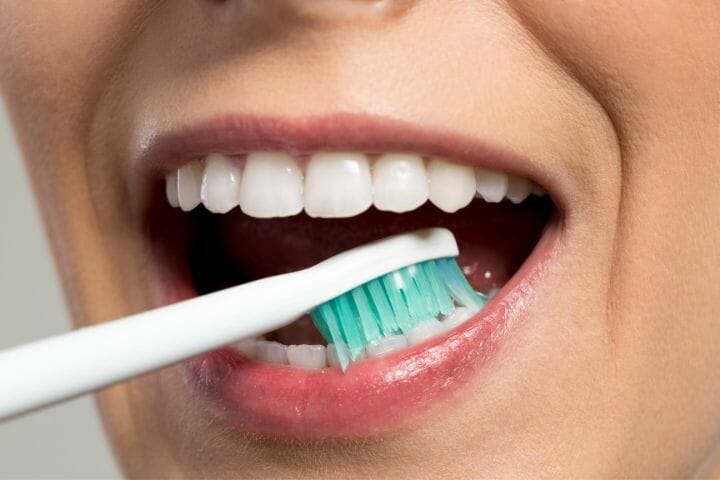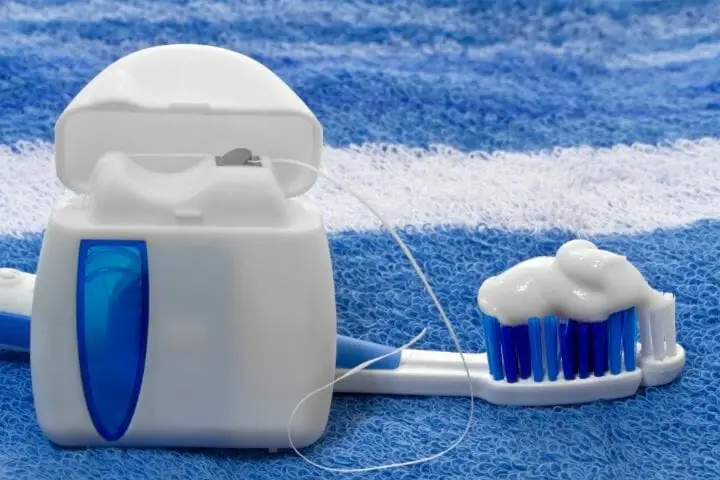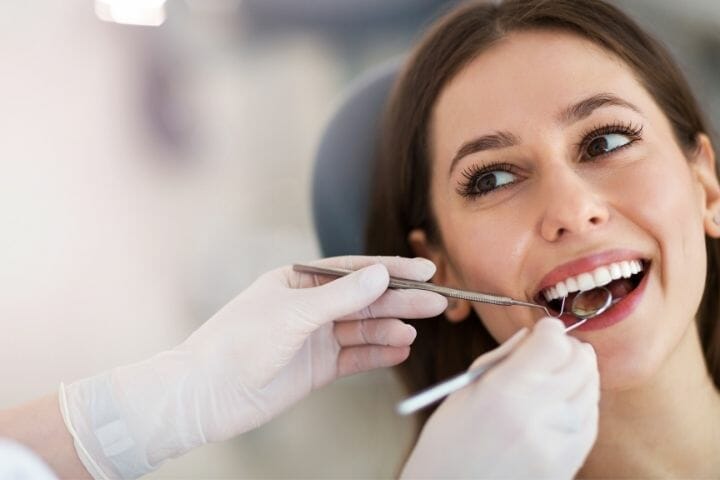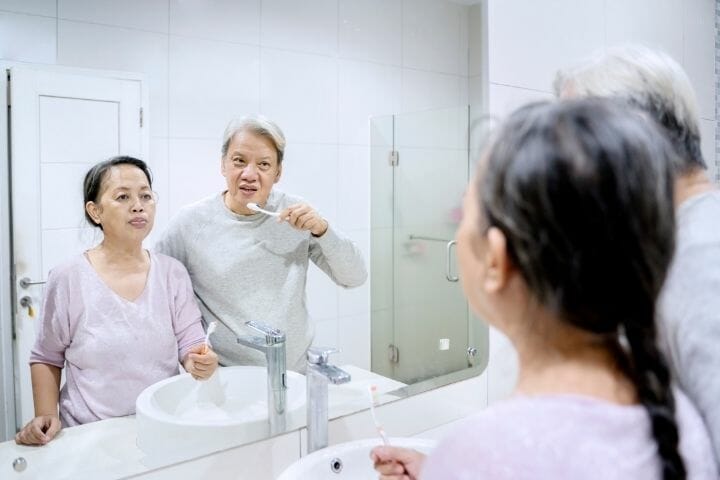When you’re a caregiver for an elderly person who is bedridden, your daily tasks can become much more challenging. A person’s oral hygiene is paramount to their overall health and wellbeing, so it’s important to make sure you’re caring for their teeth properly.

An elderly person could be bedridden for purely physical reasons but they are very alert and are able to take care of their basic hygiene needs – including brushing their teeth.
There could also be seniors who are bedridden and are not alert enough to take care of even basics like brushing their teeth and hair.
So before you are able to provide the right type of care for a senior, you will need to assess how much they are able to do themselves and how much help they will need.
Helping a senior brush their teeth when they are alert
As a caregiver, the person you’re helping may be bedridden due to recovering from surgery or another reason that does not affect their mental abilities.
When preparing to brush their teeth, here are a few steps for making sure you get everything you need and don’t have to stop part way through to grab something.
- Using a tray, or even the senior’s bedside table, assemble all of the items together that you will need to complete the task of brushing their teeth. You’ll likely need their toothbrush, floss, towels, an empty cup, a cup of water and the toothpaste they use.
- Start by putting the bed into an upright position, and have the person sit up completely (if they can).
- Make sure you put a towel over their chest so they don’t get any toothpaste or water on their clothes.
- Start by asking them if they have any pain or any areas that are bothering them. If you notice anything, make a note of it including the date you first saw it and what it looked like. If it doesn’t heal or go away in a couple weeks, you may want to consult a dentist.
- Before brushing, use the floss between their teeth and under bridges.

- Dampen the toothbrush and put toothpaste on it.
- Gently brush all the surfaces of the teeth, including the chewing surface. Electric toothbrushes help by doing most of the work for you and they are highly recommended by dentists.
- Make sure to also brush the gum line to remove any food build up or plaque before it becomes a bigger issue.
- When you’re done brushing, have them rinse out their mouth and spit it into the empty cup you brought.
- If you have a mouthwash that contains fluoride, it’s a good idea to have them swish some of it around in their mouth.
- Next, if you notice their lips are a little dry, apply some lip balm to prevent them from cracking bleeding.
- Return the senior to a comfortable position for them and make sure to remove any towels from the front of their clothing.
Some of these steps the senior may be able to complete themselves, depending on their abilities. Before starting the process of brushing their teeth, always make sure they are comfortable with you and what you’re doing.
When a senior needs help with denture care
Many seniors have either partial or full dentures, but that doesn’t mean they need less care than someone’s natural teeth.
Like natural teeth, dentures can have a build-up of plaque, bacteria and even stains.
Bacteria can really build up under the dentures and cause major issues in the future without proper care and attention.
Dentures need to be removed daily and cleaned so that you can prevent issues with oral hygiene. If a senior is bedridden they may need help with getting the tools needed to clean their dentures daily.
The senior you’re taking care of may be able to clean their own dentures if you bring the tools to them. Others may need more help with it once the dentures have been removed from their mouth.
Depending on the situation, the senior may not always have the dentures in their mouth – especially if they spend a lot of time sleeping.
If you notice any sores or spots in their mouth when you’re helping them, keep an eye on them and note if they change in shape or size. Also try to determine if it’s causing them pain (especially if they can’t answer).
Then, if it hasn’t changed in a couple weeks you should call their dentist to make an appointment and take a look at the spot.
PROTIP: when a bedridden senior isn’t wearing their dentures, placing it in water or the cleaning solution can help keep the shape of the dentures and prevent them from drying out.
It’s important to make sure the dentures are removed before bedtime as your gums need space to breathe. Wearing the dentures overnight can cause stomatitis to develop, which can hinder a person’s ability to eat, talk and even sleep.
Can someone get dementia if they don’t brush their teeth?
There has been a couple studies on seniors who do not brush their teeth regularly and cases of dementia.
These studies found that bacteria can move from your mouth to your brain. When the bacteria gets there it can excrete a protein that will destroy nerve cells.
Therefore, bacteria moving from the mouth to the brain can increase the risk of Alzheimer’s dementia but it doesn’t cause it.
Additionally, if someone already has dementia or Alzheimer’s not brushing their teeth can make the symptoms worse or cause the disease to progress quicker than it would for someone who brushes regularly.
Make regular dental appointments
Even if you’re on top of helping your senior loved one take care of their teeth, and brushing regularly, they will still need to see a dentist for checkups.
When a senior is bedridden, though, it can be much harder to make sure they see their dentist on a regular basis.
Thankfully, there are dentists in almost every area that will come to homes or visit care facilities. This can really help to make sure seniors are getting the dental care they need, without worrying too much about how they’ll get there.
If you’re having trouble locating a dentist who will make house calls you can contact your dentist for a referral and see how they can help.

If you’re having trouble brushing a senior’s teeth
Sometimes brushing a senior’s teeth when they’re bedridden can be difficult, especially trying to navigate all the angles and make sure you completely clean all their teeth.
If you’re having troubles getting their teeth completely clean, you may want to consider using a child’s toothbrush.
Children’s toothbrushes are much smaller than a full size one, and it makes it easier for you to move around while the person is bedridden and may not be able to help.
Additionally, with a smaller toothbrush you are less likely to slip and accidentally poke or scrape their gums.
Swap out the mouthwash
Many mouthwash products have fluoride in them, and that can be dangerous if too much of the product is swallowed.
Instead of using regular mouthwash, switch it out for an antibacterial mouthwash because it is far less dangerous if your senior loved one swallows a bit while you’re brushing.
Further, if it’s really difficult for your loved one to spit out the toothpaste as you go you may not have to use toothpaste.
You can mix a solution of equal parts antibacterial mouthwash and water to brush their teeth. You will still need to try and make sure they spit it out as much as possible. It will be easier for them to spit it out of their mouth, too.
This solution will do just as good of a job for cleaning their teeth and preventing bacteria from building up.
How to get a senior with dementia to brush their teeth
In the early stages of dementia, people will quite often still take really good care of their teeth.
As the disease starts to progress, they may start to forget to brush their teeth on a regular basis or be unsure as to why exactly they need to do this.
If you’re trying to help a senior who is bedridden brush their teeth, but they are living with dementia and this makes it difficult there are a few things that can help.

Try short, simple instructions
For most people, saying brush your teeth may seem like a simple task but for people with dementia it’s not. Start with tasks like turning on the water, running your toothbrush under the water, putting toothpaste on the brush.
Ask them to mirror you
If you are brushing your teeth, the person with dementia may be more likely to follow what you’re doing.
Try different toothbrushes
Some of the bristles on toothbrushes may be too harsh to the touch, so they might need something softer. Try getting them a softer brush and see if it’s easier to get them to brush their teeth.
Check out any pains
If you notice that they are hesitant to brush certain areas of their mouth, you may want to check it out and see if there’s a sore or something going on that’s bothering them.
